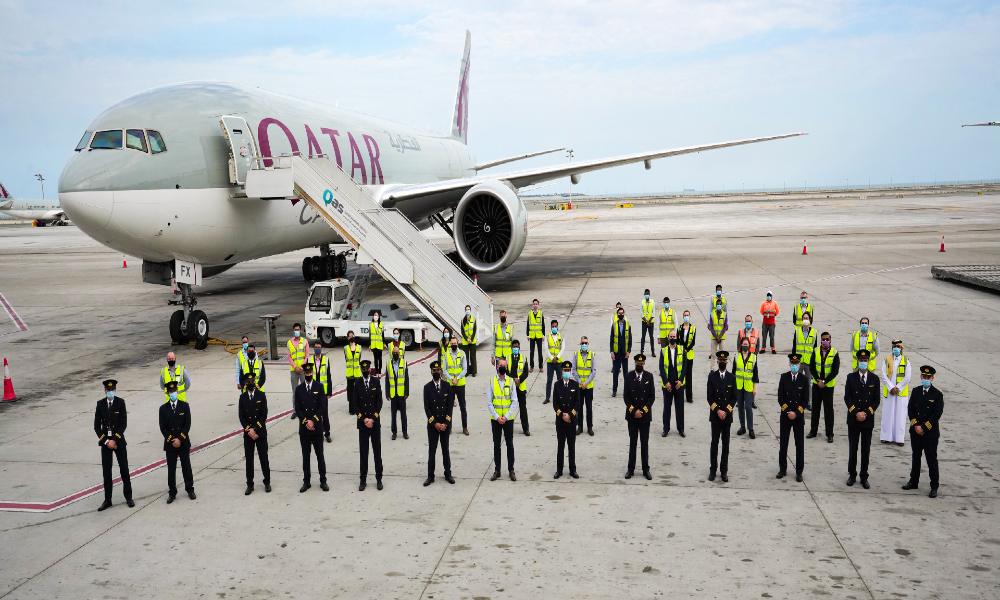
IATA annual meet debates cargo future; Qatar Airways double cargo earnings in 2020-21
The world’s number one international cargo carrier carried 2.73 million tonnes in 2020-21 (April to March), an increase of 4.6 percent from 2.61 million tonnes cargo carried the previous year, according to the annual report published last week.

Akbar Al Baker, CEO, Qatar Airways, is one of the key speakers at the session - What's Next for Air Cargo After its Heroic Performance in the COVID-19 Crisis? - at the annual general meeting of the International Air Transport Association (IATA) being held in Boston, USA. And it is for the first time that IATA has included a session on cargo in its AGM.
Jessica Tyler, Head of Cargo, American Airlines; Don Colleran, CEO, FedEx Express and Brandon Fried, Executive Director, Airforwarders Association are the other speakers at the panel discussion on the future of cargo.
The move assumes significance in the backdrop of Qatar Airways doubling its cargo earning to 18.5 billion riyal in 2020-21 compared to 9.9 billion riyal the previous year on freighter additions and higher cargo carried during the year.
The world’s number one international cargo carrier carried 2.73 million tonnes in 2020-21 (April to March), an increase of 4.6 percent from 2.61 million tonnes cargo carried the previous year, according to the annual report published last week.
IATA data show Qatar Airways had reported 13.7 billion cargo-tonne kilometres (international) in 2020 compared to 10.3 billion cargo-tonne kilometres for Fedex and 9.5 billion cargo-tonne kilometres for Emirates.
Qatar Airways has also reported a big increase in cargo-tonne kilometres in the 2017-19 period, IATA show. From 10,999 million in 2017 with an impressive growth rate of over 19 percent, it increased over 15 percent to 12,695 million in 2018 followed by nearly 3 percent increase to 13,024 million in 2019.
Fleet growth adds cargo glow
Qatar Airways added five brand new Boeing 777 freighters in 2021. Three of them joined the fleet in January followed by the fourth one in March and the fifth freighter in April this year. The five freighters were ordered at the Paris Air Show in June 2019. The carrier also removed the entire Airbus freighters from its fleet. As of now, it operates an all-Boeing fleet of freighters that include 2 B747-8Fs and 26 B777Fs. During the pandemic the carrier also added six mini freighters which are B777-300ER cargo only passenger aircraft.
“We made no secret from the beginning that the order of five B777 freighters placed at the Paris Airshow in 2019 was to replace and phase out A330 freighters. This is part of streamlining our freighter fleet and going in for a homogenous fleet for very obvious reasons of optimisation and synergy,” Guillaume Halleux, chief officer cargo, Qatar Airways, told STAT Media Group in an earlier interview.
From April 1, 2020 to March 31, 2021, the carrier helped transport over 500,000 tonnes of medical equipment, PPE and aid.
“During the peak of the pandemic, the airline operated a record 183 flights a day in May 2020. In total, Qatar Airways Cargo operated more than 1,100 charters during 2020-21 carrying over 53,000 tonnes of essential aid, medical supplies, food and live animals among other cargo,” the report said.
End of the blockade and the positive impact
In January this year Saudi Arabia, Bahrain, Egypt and the United Arab Emirates agreed to restore ties with Qatar, ending a blockade that has been in place for more than three years.
The blockade, implemented without warning on 5 June 2017, specifically targeted Qatar Airways with the objective of shuttering Qatar Airways’ local operations, destroying the value of the airline’s investments and causing widespread damage to Qatar Airways’ global network of operations.
Qatar Airways’ biggest benefit from the end of the blockade will be access to airspace over Saudi Arabia, Egypt, UAE, Bahrain and more countries. Access to these countries will allow Qatar to restore flights to many hubs in the Middle East including Jeddah, Dubai, Abu Dhabi, and Manama. The end of the blockade also means the cost of shipping via Qatar will come down.
Loss doubles
The airline doubled overall annual loss to 14.9 billion riyal due to collapse in long-haul travel and other charges. While total revenue and other operating income fell 42% to 29.4 billion riyal, passenger revenue fell nearly 80% to 7.9 billion riyal.
Baker, Qatar Airways group CEO, said the government of Qatar provided an equity injection of $3 billion “to support business continuity.”

